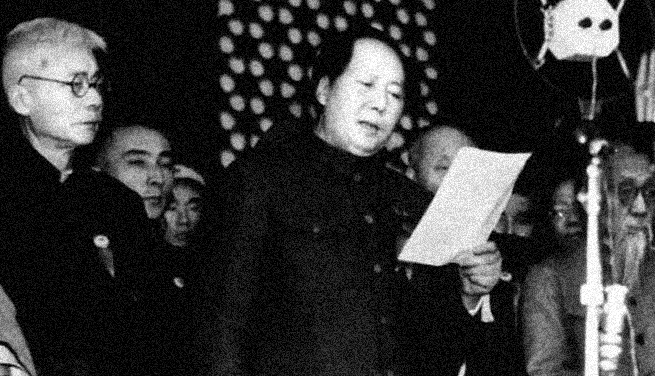
In 1955, as annihilation of all that had come before was proceeding apace, Chinese business owners “voluntarily” surrendered their enterprises to the Party and Mao at ceremonies presided over by the Chairman.
Frank Dikötter observes in his book The Tragedy of Liberation: A History of the Chinese Revolution 1945-1957 that the apparent happy eagerness of soon-to-be-former entrepreneurs to relinquish everything they had worked so hard for was only a facade, an effort to appease their masters. They were losing their businesses anyway.
One such was Rong Yiren, who had in tears “openly proclaimed his shame when confronted with his family’s exploitative past, confessing to 20 million yuan in ill-gotten gains, an amount he had arrived at by spending weeks going through mountains of ledgers.”
From top to bottom of the social scale, terror once again gripped the cities.
The time had come for Rong Yiren and others to hand over the keys of their enterprises to the state. But the Chairman wanted them to do so voluntarily. So later in October 1955 he invited representatives of trade and commerce to a meeting in the Yihetang Hall in Zhongnanhai, soliciting their advice. He listened carefully, occasionally expressing concern, as Rong and others begged for a Socialist High Tide in industry. Rong gave a long speech, reviewing the history of his own textile mills, which would have been doomed had it not been for liberation. Whatever reservations he and others had harboured against state intervention in the following years had been completely misplaced…. More speeches by other captains of industry followed. Mao smiled….
Back in Shanghai, Rong, who was one of the leaders of the All-China Federation of Industry and Commerce, prepared his fellow industrialists for nationalisation. When they were ready, the Chairman came through Shanghai. To mark the occasion, Rong offered his Shenxin Number Nine Mill to the Chairman. Mao was delighted. Then came a meeting with eighty leading businessmen at the Sino-Soviet Friendship Hall, the gleaming new structure towering above all other buildings in Shanghai. This occasion, too, was full of gravitas, as the doors swung open and the Chairman slowly walked into the hall, his face beaming with a benevolent smile. The audience gasped, stiffening with surprise. ‘He smiles often, and his expression is usually friendly and mild. He gives the impression of being a kindly, simple, honest peasant.’… Robert Loh, who was in the audience, describes what happened next: ‘One by one, responding to the cues of the Chairman, the leading industrialists asked that socialism be introduced with the least delay possible. They vied to outdo each other in flattery. Mao listened for two hours.’
Mao left, promising to give serious thought to their opinions…. A few weeks after the meeting, the authorities announced that the transformation to socialism was to be accomplished not in six years, as most had anticipated, but in a mere six days. Shock teams were sent around the city to nationalise all industry, forcing businessmen to give up their enterprises and become members of the Federation of Industry and Commerce. Most did so out of fear, but they had to demonstrate wild enthusiasm in public…. Every entrepreneur knew that, once his property had been handed over to the state, his only means of livelihood would depend on the whim of the party.
Rong’s “career” continued; Mao gave him the job of deputy mayor of Shanghai. Rong was also willing to serve the Party by presenting himself and his household as an example of the unblemished success of the communist revolution.
One French visitor who witnessed this touching tableau [dogs playing in the garden, wife knitting, Marx and Shakespeare on a book shelf, a crucifix on the wall to prove freedom of worship] was truly awed: ‘I have never seen a more contented family,’ she said. Rong had an answer to every question. When pressed and asked how he could be so happy, he would purse his lips and consider the question gravely: ‘I was worried at first,’ he would confess. ‘When the Communists liberated Shanghai, we were apprehensive, if not for our lives, at least for our property.’ Then he would look his guest in the eye, his voice ringing with sincerity. ‘But the Communists have kept their promise. We have come to realise that the Chinese Communists never deceive people.’





